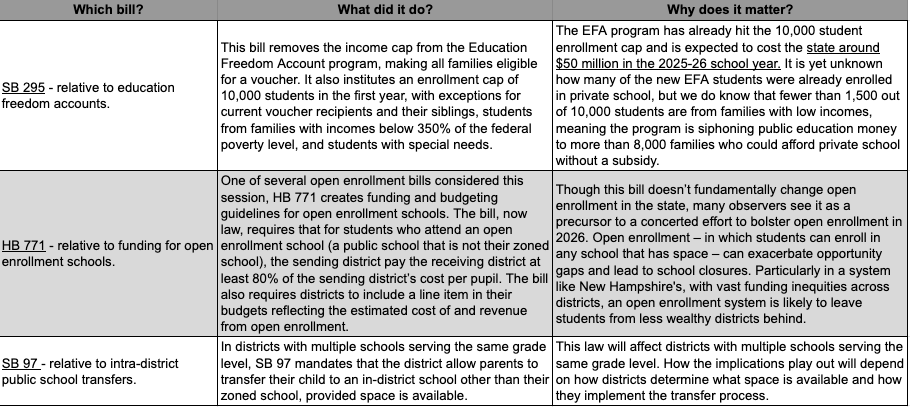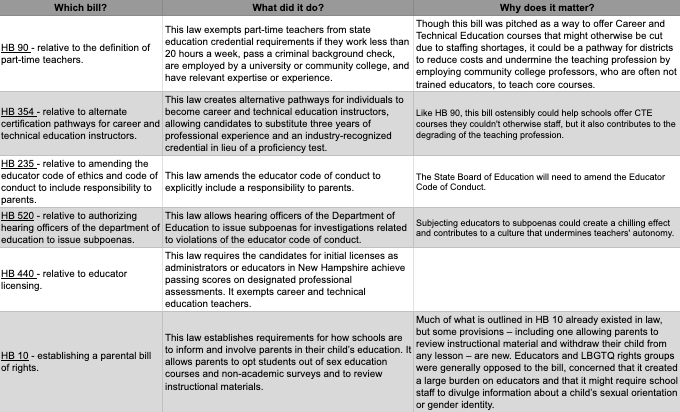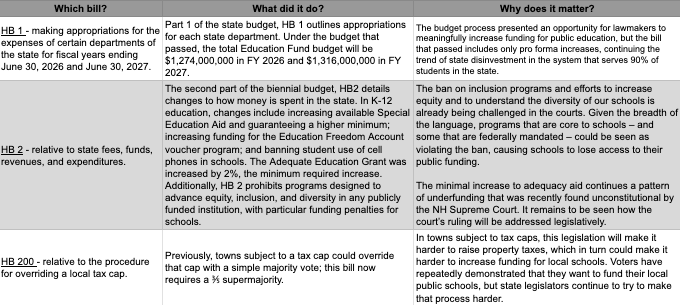Teeing up the 2026 legislative session
September 25th, 2025
Fall marks an important return not just for students and teachers, but also for New Hampshire’s lawmakers, who earlier this month began to discuss tabled legislation and the filing of new legislative service requests (LSRs), which could become bills next year.
These early meetings and LSRs give us a sense of what is to come in 2026, but before we look ahead, it’s important to recap what happened during the 2025 legislative session, in the first year of the current biennium (2025-2027).
What happened last year?
The 2025 legislative session was a challenging one for public schools. The 14 education-related bills that became law tend to fall into three categories:
Increasing school choice (SB 295, HB 771, SB 97):
New laws this year increase the availability of private school vouchers and public school transfer options. Vouchers channel money from the public system to private expenses with little accountability or transparency; public school transfer options – including so-called “open enrollment” policies – create instability and unpredictability that ultimately exacerbate opportunity gaps for students, families and communities.

Undermining the teaching profession (HB 90, HB 354, HB 235, HB 520, HB 440, HB 10):
Within this broad category, new laws fall into two groups: those that lower the requirements to become a teacher, and those that make the work environment more challenging for New Hampshire’s teachers. The first set includes several bills creating alternative pathways to certification for part-time educators. Alternative pathways can be a viable way to increase the teacher workforce, but as designed, these laws will make it easier for districts to fill vacancies with professionals who are not trained and qualified educators. This could become a cost-cutting strategy for districts, creating downward pressure on teacher pay and benefits and ultimately meaning students are not always taught by highly qualified, certified and trained educators. The second set of bills related to the teaching profession introduce new guidelines for educator conduct, creates additional channels for parents to file complaints, and increases the power of the State in the complaint process. The cumulative effect is to undermine teachers’ autonomy, degrade parent/teacher relationships, and to create an environment of fear. Laws such as these create a chilling impact on the classroom for students and teachers alike.

Failing to increase school funding (HB1, HB 2, HB 200):
2025 was a budget year, and what’s notable is that the legislature passed effectively the bare minimum funding increase for education. Under HB 200, the legislature also made it harder for towns subject to a tax cap to override that cap should they want to. And despite considering a number of bills that could have positively affected school funding, the legislature ultimately did nothing to address New Hampshire’s disparate funding systems.

What might happen in 2026?
Many bills in 2025 were tabled, retained in committee, or referred back to committee. Lawmakers are currently discussing which of these bills will move forward in 2026.The text of a bill can change before it comes to the floor, but between the holdover bills from last year and the 800+ news LSRs that have been filed so far, we have a sense of the conversation that is brewing. Here are some topics we expect to hear about in 2026:
Expanding school choice even more (but with guardrails?)
New Hampshire’s school voucher program hit its enrollment cap within weeks of universal eligibility becoming available. We can expect to see legislation aimed at removing that cap, expanding eligibility and spending that diverts funds from our public schools. Because of the substantial cost of the program (now at nearly $50 million of new spending), we expect to see legislation that attempts to put guardrails around the program – it remains to be seen whether those efforts will get any traction. In 2025, efforts to add accountability and transparency measures failed to pass.
Pushing open enrollment
A number of open enrollment bills are still on the table coming out of 2025, and though it’s unclear which versions might move forward, it’s likely open enrollment will be a key topic in 2026. Open enrollment – a system in which students can enroll in any public school in the state – would fundamentally change the public school system. In a state like New Hampshire, it would create gaps between those who can drive distances to access the school of their choice, and those who cannot. Given the number of small schools in the state, it’s also highly likely such a system would lead to school closures, as schools that lose a few students become financially unsustainable. While the specific impacts will depend on the policy details, it is hard to imagine a system of open enrollment that does not exacerbate opportunity gaps and consequently impact communities.
Monitoring teacher speech
Several LSRs attempt to build on the educator code of conduct amendments by dictating what educators can say and creating channels to discipline teachers seen to be in violation. Along with the laws passed this year, these bills will make it harder for teachers to do their jobs – and may ultimately drive people away from the profession.
Continued funding debates
Many of the bills currently being discussed in committee involving changing how public education is funded. Whether any of these bills make it to the floor is a question mark; this has been a decades-long debate with a recent Supreme Court ruling underscoring New Hampshire's funding formula is woefully inadequate and unconstitutional. The number of bills and LSRs dealing with school funding indicate it’s an issue area for members of our state legislature but very little traction has been gained in developing a long-term commitment and solution for addressing the state’s funding formula.
Have a question? Contact us. Stay in the know and follow us on Facebook, Instagram, and LinkedIn, and join the New Hampshire Education Network (NHEN), our network of New Hampshire parents, educators, business leaders, and community members to stay up to date on the latest developments in education policy.
